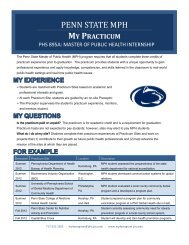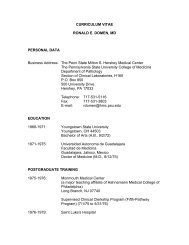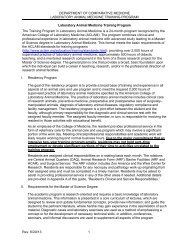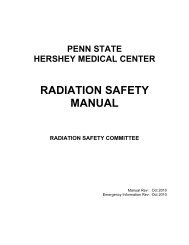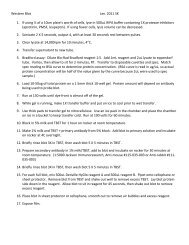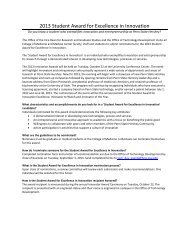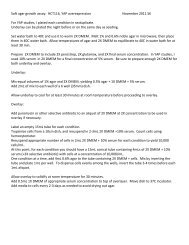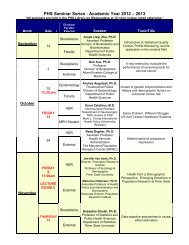Penn State Graduate Student Career Guide - Biomedical Sciences ...
Penn State Graduate Student Career Guide - Biomedical Sciences ...
Penn State Graduate Student Career Guide - Biomedical Sciences ...
You also want an ePaper? Increase the reach of your titles
YUMPU automatically turns print PDFs into web optimized ePapers that Google loves.
48 CONSIDERING AND ACCEPTING JOBS OFFERS<br />
You should learn about the company’s<br />
compensation philosophy and how<br />
increases are determined. Your earning<br />
potential and how it is determined is<br />
more important than your starting salary<br />
in the long-run.<br />
Company Culture<br />
Your work environment is probably<br />
one of the most important factors in<br />
your decision, especially in the short<br />
term. Whether it is formal or informal,<br />
structured or unstructured, the environment<br />
should match your personal<br />
style. Company culture, or values which<br />
underlie the work environment, is also<br />
a key to your decision. The company’s<br />
culture should match your own values<br />
so you feel no conflict of interest.<br />
Supervisor and Colleagues<br />
Is your supervisor-to-be interested in<br />
your professional growth? Are you<br />
compatible with your colleagues? You<br />
will want to choose a job that involves<br />
people with whom you feel comfortable.<br />
Your supervisor can be especially<br />
critical as you learn your job and the<br />
company’s way of doing things, and he<br />
or she can greatly impact your ability to<br />
move ahead.<br />
Opportunity for Growth<br />
Will you have the opportunity to grow<br />
professionally? A position that will<br />
serve as a springboard offers greater<br />
challenges over time, additional responsibilities,<br />
and a variety of activities in<br />
which you can become involved.<br />
Many factors can affect your satisfaction<br />
with your choice both immediately and<br />
down the road. You should take your<br />
time to determine how well each individual<br />
job offer helps you attain your<br />
long-term career goals.<br />
Ethics of Offers and Acceptances<br />
You may receive several offers during<br />
your job search. You aren’t required<br />
to accept the first job offer that comes<br />
along and can continue to interview and<br />
consider all of your job offers until you<br />
have accepted a job.<br />
But once you have accepted a job offer,<br />
verbally or in writing, you are bound by<br />
ethical standards. You should:<br />
• Withdraw from the recruiting process.<br />
You have made a commitment when<br />
you accept an offer. The employer<br />
stops interviewing and holds the position<br />
for you. Accepting an offer as a<br />
precautionary measure, hoping that<br />
something better will come along, is<br />
not only misleading to the employer,<br />
but also limits the opportunities for<br />
other students who are genuinely<br />
interested in that employer. Also,<br />
you may change your mind and want<br />
to work for that company someday.<br />
Organizations have long memories for<br />
applicants who renege.<br />
• Let all employers who are actively<br />
considering you know that you are no<br />
longer available and that they should<br />
consider other candidates.<br />
• Notify <strong>Career</strong> Services so that we will<br />
not refer your resume to any other<br />
employers. Cancel all pending<br />
interviews.<br />
• If you face circumstances that force<br />
you to renege on an acceptance<br />
(e.g., critically ill parent, marriage),<br />
you should notify your employer<br />
immediately and withdraw the acceptance.<br />
If you have accepted a signing<br />
bonus, you should return it.<br />
Employers are also bound by ethical<br />
standards. They should:<br />
• Provide accurate information about<br />
their organization, positions, career<br />
advancement opportunities, and<br />
benefits, as well as timely information<br />
on your status in the hiring process<br />
and any hiring decisions.<br />
• Not exert undue pressure. Employers<br />
are expected to provide candidates<br />
with a reasonable amount of time to<br />
make a decision about an offer as well<br />
as a reasonable process for making a<br />
decision. Also, employers should not<br />
pressure you into reneging on your<br />
acceptance of another offer.<br />
• Offer fair and equitable assistance,<br />
including (but not limited to) financial<br />
assistance and outplacement services,<br />
if, because of changing conditions<br />
(e.g., downsizing, or withdrawn contracts),<br />
an employer must revoke a job<br />
offer that you have accepted.<br />
If you have questions about any aspect<br />
of the job search process, including<br />
evaluating offers and ethical standards,<br />
you may speak with the Drop-In<br />
Counselor, who is available between<br />
8:30 a.m. and 5:00 p.m. weekdays and<br />
until 7:00 p.m. on Tuesdays during the<br />
fall and spring semesters in the Bank of<br />
America <strong>Career</strong> Services Center.<br />
You should take your time to determine<br />
how well each individual job offer helps<br />
you attain your long-term career goals.




